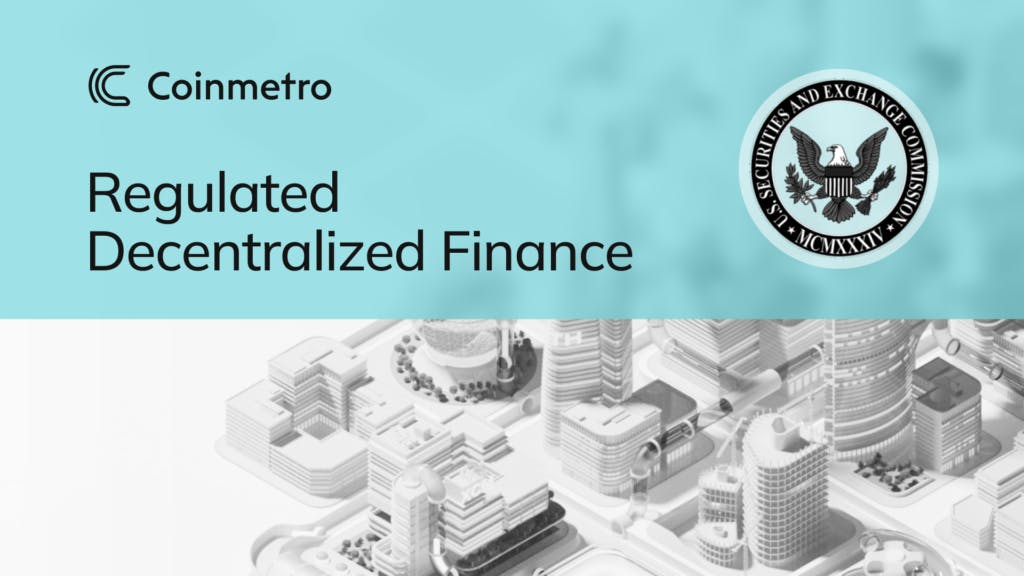Regulated DeFi in Focus
December 5, 2025

by Kamil S
December 5, 2025
In the past decade, the crypto industry was scarcely regulated. A few years back, Coinmetro’s CEO & Founder Kevin Murcko and others brought crypto regulation into focus.
What is DeFi, why should it be regulated, and how to do it? This article will attempt to shed light to these questions.
In essence, decentralized finance, or DeFi, is a global financial system that uses crypto and blockchain technology, typically Ethereum, to manage financial transactions – without relying on intermediaries, such as brokerages, banks, and the like.
This is done by using smart contracts – basically, computer programs that self-execute when certain, predefined conditions are met.
Why do we need to regulate DeFi that was created to be decentralized?
Obviously, regulatory risks are great. For the regulator, two grey areas are money laundering and terrorist financing. To explain, the reach of DeFi is global, financial transactions are anonymous, and as a rule, there are no identified intermediaries.
Tracking crypto financial transactions is possible, but you will only end up with an address. This leaves room for fraudsters.
In addition, DeFi’s intent is to become more widely accessible – in particular, to public companies and regulated institutions. Currently, the U.S. regulations and the European GDPR are a barrier for large players interested in DeFi as consumer protection is at stake.
Read: Hybrid Blockchain and GDPR
For the most part, to protect consumers, U.S. regulators are actively seeking to adapt existing regulations to the rapidly developing DeFi environment, which is hindering legislative efforts to legally clarify its form.
The GDPR, on the other hand, focuses on data protection and empowers adjustability of data. Contrary to this, blockchain technology is known for its immutable nature. As a result, altering or deleting any data stored on the chain is anything from extremely difficult to impossible.
There is another interesting twist to issues with the DeFi regulatory framework – centralized financial institutions and regulators may see the evolving sector as a threat and may not want to lose their dominant position.
For DeFi to operate safely, while also realizing its huge potential, there need to be public and private partnerships between regulators, developers, and DeFi platform providers.
The DeFi landscape also needs to adapt to regulations, keeping the sector decentralized at the same time. Equally important, those benefiting from innovation in the sector should be able to continue to evolve the tools responsibly.
This said, hybrid blockchains can be considered a possible answer to the question and are a very good example of how blockchain technology meets the GDPR requirements.
The hybrid blockchain design is distinguishable in that it is not open to everyone but still offers such blockchain features as integrity, transparency, and security. The members of such a blockchain can choose its participants as well as decide which transactions to make public.
Hashing is a crucial feature of hybrid blockchain technology. A cryptographic hash represents digital fingerprints of a certain amount of data. In simpler terms, it is digital evidence of the actual data.
Several hashing algorithms can be used together, but some cryptographic hashes are more common than others. Hash values are unique; therefore, should any data be altered, the respective hash value would immediately change as well.
DeFi is indispensable in democratizing access to financing. Hopefully, regulators can empower the development of crypto and blockchain technology by regulating with common sense, viewing the industry as an opportunity, not as a threat.
To stay up to date with DeFi developments, feel free to join Coinmetro’s Discord or Telegram communities. Alternatively, you can sign up to our platform to embark on a safe and exciting crypto journey.
Tags
Related Articles

Regulatory Sandboxes: Fostering Crypto Innovation Within Legal Frameworks
The cryptocurrency industry’s fast rise fuels an important debate. Innovation aims to transform finance, enhancing speed and access. Yet, regulators…
5m

Crypto Options Trading: Strategies and Market Insights
Cryptocurrency markets have rapidly expanded beyond simple buying and selling. One of the most significant developments has been the rise of…
6m

The Rise of Social-Fi: Blending Social Media with Decentralized Finance
In recent years, social media and finance have started to merge, creating Social-Fi. This concept blends the engagement of social platforms with…
6m

DeFi Insurance Platforms to Watch in 2024
Decentralized Finance (DeFi) insurance addresses the growing need for insurance against hacks, smart contract failures, and other DeFi-related risks.…
7m